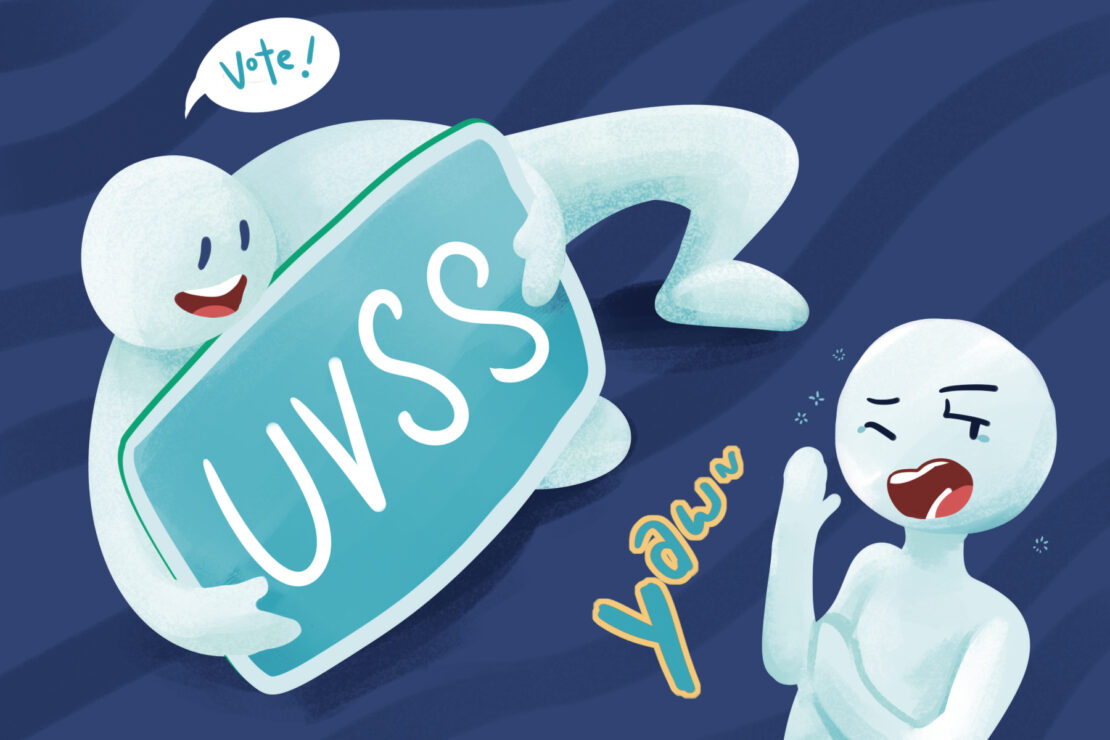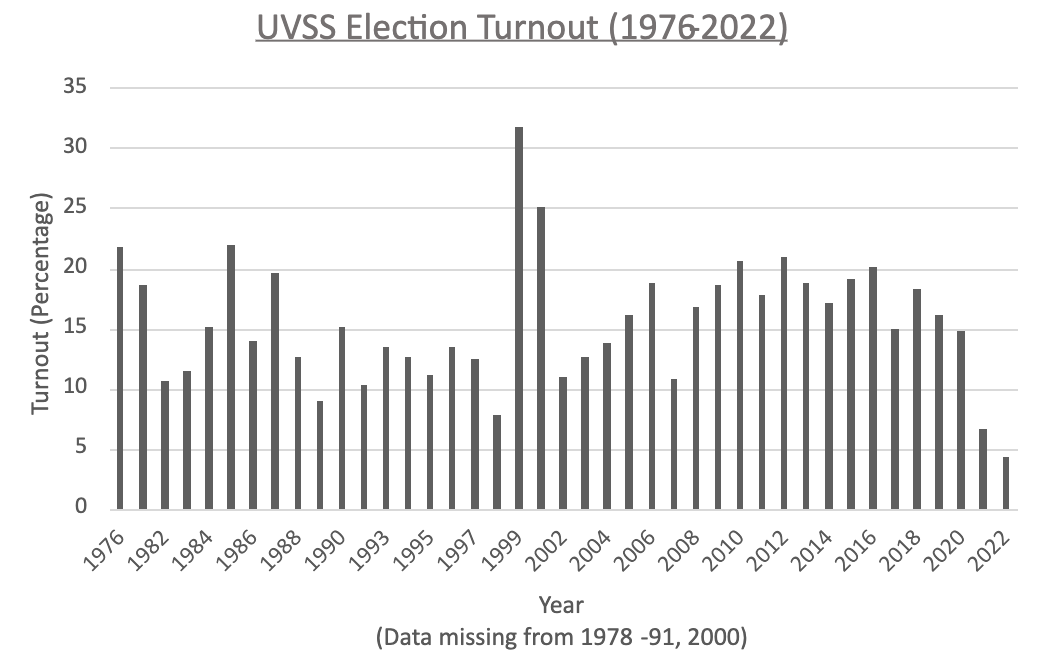A look at UVSS engagement and voter trends over the years

“[E]lections aren’t cool,” reads this year’s UVSS electoral report — a document created by the independent Electoral Office to analyze the outcomes.
The sentiment seems to be prevalent across the university; of the eligible 20 388 students, only 820 bothered to cast their vote in the spring election. That’s 4 per cent — the lowest voter turnout ever.
According to previous Electoral Office reports, this year’s 4 per cent and last year’s 6.6 per cent are the lowest turnouts since the former record low in 1998, which garnered 7.7 per cent.
Izzy Adachi, former UVSS director-at-large and current director of campaigns and community relations-elect, thinks the pandemic deserves its share of the blame.
“For a lot of people, the UVic Student Society is not super high on their priority list, despite the services we provide.”
In previous years, candidates could hand out leaflets, put up posters, or chalk the campus. But for the past two elections, COVID precautions have taken precedence.
This spring’s electoral report indicated significant issues with reaching voters via social media, particularly with the Office’s relatively low follower count. At the time of writing this article, the UVSS Electoral Office has 283 Instagram followers, and the UVSS 6 323.
“Quite simply, 20 000 UVic students do not follow the UVSS elections Instagram, and I don’t think we should expect that they do,” said Samuel Holland, UVic student senator and newly elected UVSS director-at-large.
According to the previous election reports, voter turnout for Spring elections appears to have fluctuated significantly since 1976, with 2021 and 2022 being the worst years ever.

It’s not obvious that the pandemic was the only factor involved this year either. Many other university student societies actually had greater success in 2022 than in 2021.
According to a Peak article, Simon Fraser University’s student society elections saw a larger voter turnout than the previous year. “The 2022 election saw over 2,300 voters for the presidential vote while the 2021 SFSS elections had roughly 500 to 900 voters for each candidate,” read the article.
The University of the Fraser Valley’s UFVSUS (a bit of a mouthful) election turnout increased to 9 per cent, up from 4 per cent.
The AMS, UBC’s student society, received a voter turnout of 17.4 per cent, up 10.5 per cent from the previous year. (Admittedly, this may be the result of Remy the Rat’s bold campaign promises.)
Adachi suspected the repeal of the slate system also had a role to play in UVic’s poor turnout. Remember the peppy purple logos of Envision, Energize, and Encompass? These mini political parties were the norm on campus until they were abolished in 2021. (2020 had “co-operatives,” which former Director of Outreach Sarina de Havelyn called “pseudo-slates” in an interview with the Ubyssey.)
“The slate system had a lot of problems with making a toxic environment during the campaign season,” said Adachi, “but it also, admittedly, made things a lot more exciting for students to watch.”
The effect of the slate system on voter turnout remains unclear. In 1999, no candidates formed a slate, yet voter turnout hit a record high of 31.7 per cent. This may, however, have been due to the decision to allow candidates to campaign at polling stations and a contentious referendum question.
Holland told the Martlet that he thinks the online campaign was a contributor, but not the cause of 2022’s low turnout. “The problem was there before COVID,” said Holland. “COVID just magnified all the problems.”
Holland said that the UVSS has failed to make the case to students why they should care about it.
“None of the referenda items that the UVSS has been putting forward are exciting to students,” he said.
He said that one of the only times he had seen students become excited by a referenda item was when it was proposed that the former PIRG funds go towards creating a Makerspace, which the Board decided not to go ahead with.
“Students are willing to put their name down, and they’re willing to put their time into something that is exciting to them.”
Holland said he would love to see more referenda items coming from all avenues of the university, and not just from the Board. He suggested that the UVSS engage more with first years, so incoming students are aware of the union from the get-go.
“Lack of engagement within the union is going to be terrible for university governance,” said Holland.
Issues with the Board
The apparent lack of interest with the union extends not to just voters, but to candidates as well. This year, the UVSS had to extend the nomination period for lead directors and directors-at-large after receiving only four nominations.
This comes off the heels of an unprecedented number of lead director board resignations, with some of the previous leads citing mental health issues, unfair compensation, or frustrations with UVSS culture. After former Director of Finance and Operations Dipayan Nag resigned in February, only one out of the five lead directors were left on the Board.
Holland suspected there’s a general perception that the role of a lead director is not accessible to all students, in terms of both compensation and schedule.
“If you can’t actually — even working full time — make rent, I think that’s a serious concern.”
At the SAGM only a year ago, the motion passed to pay lead directors a wage of $18.50 per hour plus one per cent annually. Recent reports estimate the Greater Victoria living wage at around $20.46 per hour.
“It’s abundantly clear that the leads are doing way too much work,” said Holland, in reference to how board members often work more than their required hours. “It’s effectively a full-time job that also expects you to do classes.”
Adachi also spoke of the toxicity and aggression of student politics. “Anytime you have students with very strong opinions and loud voices, it can often seem like those opinions are the ones that matter the most, when they aren’t necessarily representative of the student body.”
“The Board is clearly a complete mess in terms of compensation, the amount of responsibility, and issues of engaging with students,” said Holland. “It needs reform.”







